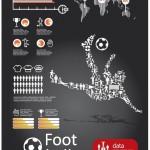(This is a guest post by Andrew Collins)
Faster than a speeding bullet, more powerful than a locomotive, able to leap tall men in a single bound, look, up in the sky, it’s AFL footy. In what is bigger than any religion Down Under, the Australian Football League is making a surprise inroad in the world’s most populous country, leaving major codes like the NFL for dead.
2010 saw China play host to Australia’s biggest sporting code as the Melbourne Demons played the Brisbane Lions in what became a thrilling encounter in Shanghai. What eventuated was a landmark TV deal, an online AFL Chinese community, 7100 Chinese spectators and a commitment from the local Shanghai government to support further games.
All this delivered by a sport relatively unknown to most parts around the world. Yet if you ask any Australian what most entertaining and thrilling sport is, most would enthusiastically say: “Why, the AFL of course.”
Although the game has limited participation potential in Mainland China, the exercise created a major ‘bridging cultures’ exercise. The AFL, having the foresight to see beyond immediate ‘tangible’ benefits, are now reaping a flurry of Chinese media and community exposure both in Australia and the mainland. If at all the objective was to get AFL footy (as they call it) on the map with the Australia-Chinese community, then it certainly delivered on that front. Having the game hosted in China, the vision to develop the online China-AFL website, housing a plethora of Chinese content designed to educate and promote footy were all major steps forward.
 Mandarin-speaking Chinese living in Australia now tops 600,000, most of which reside in the two key cities of Melbourne and Sydney. In Australia that represents roughly 5% of the total Australian population, which provides a significant opportunity for growth within the Australian domestic market. Participation with Chinese is low, however, those levels should improve significantly as exposure grows and more connections are made with existing Chinese AFL footy fans that can support the promotion of the game in Australia and China.
Mandarin-speaking Chinese living in Australia now tops 600,000, most of which reside in the two key cities of Melbourne and Sydney. In Australia that represents roughly 5% of the total Australian population, which provides a significant opportunity for growth within the Australian domestic market. Participation with Chinese is low, however, those levels should improve significantly as exposure grows and more connections are made with existing Chinese AFL footy fans that can support the promotion of the game in Australia and China.
Talent and broadcast opportunities are obvious outcomes with bridging this culture divide. By taking the first step towards what we can assume will be a 100+ year relationship, the AFL has shown the Chinese community they are serious about engaging with them, both locally on a grass roots educational level and in terms greater cultural integration; going to the footy on a weekend is a great pastime which everyone can enjoy.
So what next for the AFL? Only time will tell yet a legacy has been left with mainland Chinese fans finding it difficult to ignore as 2011 sees a live AFL game on free to air TV for each of the 22 home and away season rounds. Back in Australia, ‘footy’ is everywhere and it’s difficult to engage with any mainstream media without learning about the week’s footy news. Perhaps now as the league builds on what became “The Year AFL Went To China,” this growing power may take notice of what could be. Who knows, we could have a Chinese AFL star sooner than we think.
###
Andrew is the CEO/Founder of Mailman. A leading online communication agency specializing in connecting International brands, sporting organizations and government with the global Chinese consumer. Mailman was responsible for the creation and deployment of the AFL online community in 2010.
Image by jamesdphotography





In this videos mas asombrosos manner, you
are more likely to grab people’s attention. Adobe Flash,
Adobe After Effects, Adobe Premiere. At least four protesters
and one police officer were killed in the northwestern city, along
with 40 injured and two cinemas and two shops
torched.